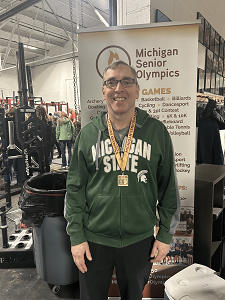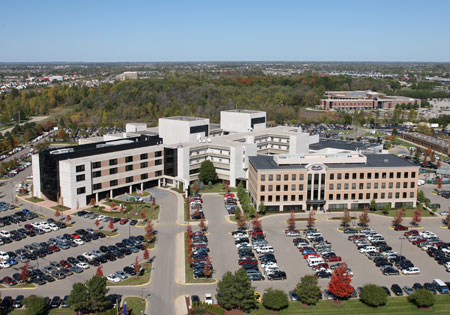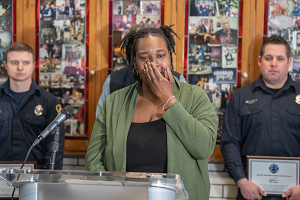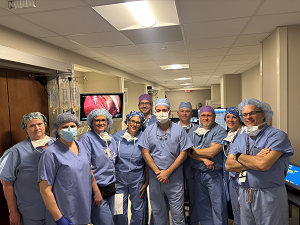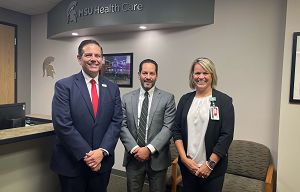First TAVR Procedure Performed at Henry Ford Macomb Hospital

Alternative to Open-heart Valve Replacement Now Offered
CLINTON TOWNSHIP – Doctors performed the first two catheter-based replacements of an aortic heart valve this week at Henry Ford Macomb Hospital, part of a continued expansion of the nationally recognized transcatheter aortic valve replacement (TAVR) program of Henry Ford Health System.
“This minimally invasive, revolutionary procedure to replace a defective heart valve without open-heart surgery brings new hope for people with advanced heart disease,” said interventional cardiologist Samer Kazziha, M.D., Chief of Cardiovascular Services for Henry Ford Macomb Hospital.
TAVR was an excellent option for both Christine Gilbert, an 87-year-old woman from Mt. Clemens, and Carole Wesner, an 82-year-old Shelby Township resident. Both women were diagnosed with aortic stenosis and underwent the TAVR procedure on August 7. Both patients were released from the hospital on August 8 and are recovering comfortably at home.
“TAVR is easier on the patient, allows for quicker recovery and, ultimately, can improve the patient’s quality of life,” said Raed Alnajjar, M.D, Henry Ford Macomb Hospital’s Director of Cardiothoracic Surgery Services. “We’re pleased to now offer this option close to home for our patients in Macomb County and surrounding areas.”
Ms. Gilbert has come a long way since she first visited an urgent care in May, for what she thought was indigestion. An EKG showed that she was having a heart attack and she had a stent put in that day, followed by balloon valvuloplasty in June.
“My shortness of breath is gone, I feel less tired and I’m able to climb stairs without feeling winded,” said Ms. Gilbert, a retired MISD bus driver, just one day after the TAVR procedure. She is anxious to get back to quilting, treasure hunting at garage sales, tending her flower garden and walking her dog.
Ms. Wesner said she also noticed immediate improvement after her procedure at Henry Ford Macomb Hospital, and she hopes to resume yoga, walking and meeting up with her friends for breakfast soon.
“I had an easier time walking this morning and I don’t get the ‘fluttery’ feeling in my chest that I did before the procedure,” she said about 24 hours after her TAVR. “It has been really awesome. Every single person is so caring, professional and gifted.”
Home to pioneering cardiologist William O’Neill, M.D., who performed the first TAVR in the United States in 2005, the Henry Ford Center for Structural Heart Disease has performed more than 1500 TAVR procedures since 2012. The expansion into Macomb County follows the opening of the Center’s TAVR program at Henry Ford Allegiance Hospital in Jackson, Mich., in June. Specially trained, multi-disciplinary teams that include expert anesthesiologists, cardiac imaging specialists and support staff have been training for months to prepare.
Dr. O’Neill, Henry Ford Health System’s Director of Structural Heart Disease, led the 2-hour procedures at Macomb with Dr. Alnajjar, as well as interventional cardiologists Dr. Kazziha and Subhi Sbahi, M.D. for Ms. Gilbert’s TAVR and interventional cardiologists Natesh Lingam, M.D. and Luay Sayed, M.D. for Ms. Wesner’s TAVR. Merajuddin Khan, M.D., led the anesthesiology team for both procedures.
TAVR may be offered as an option for patients whose advanced age, frailty or degree of heart damage makes open-heart surgery particularly challenging. Using thin catheters, the cardiologists access the heart through the femoral artery in the groin region, threading the collapsed valve up through the tubing. Once properly positioned, a balloon expands the valve, pushing back the native valve and lodging the new device in place. Patients typically notice improved symptoms shortly after TAVR and can be released as soon as the next day.
“We’re pleased to offer TAVR at Henry Ford Macomb Hospital after seeing so many patients feel so much better after their TAVRs at Henry Ford Hospital in Detroit,” said Dr. O’Neill. “We’ve also treated many people with TAVR who have been turned away elsewhere – with fantastic results.”
TAVR is one more option added to the advanced, specialized cardiology care offered at Henry Ford Macomb Hospital. The Henry Ford Center for Structural Heart Disease program at Macomb also offers balloon valvuloplasty, where a balloon is used to loosen buildup on stiff heart valves. Henry Ford Macomb cardiologists also perform the patent foramen ovale (PFO) closure procedure to close a small flap that failed to seal after birth between the two upper chambers of the heart.
To make an appointment or learn more about TAVR or other cardiology procedures available at Henry Ford Macomb Hospital, visit HenryFord.com/StructuralHeart.
###
MEDIA CONTACT:
Michelle Fusco / mfusco1@hfhs.org / 586-263-2891 office / 586-713-4051 cell
Tammy Battaglia / Tammy.Battaglia@hfhs.org / 248-881-0809 cell
Video, patient and doctor interviews, photos and b-roll available upon request.
About Henry Ford Macomb Hospital
A 361-bed hospital in Clinton Township provides comprehensive, advanced care and is recognized for cardiovascular care, cancer care, orthopedics, quality, stroke, trauma care and women’s health, with a level II trauma center and health centers in Bruce Township, Chesterfield Township, Fraser, Richmond, Shelby Township and Washington Township that offer outpatient and primary care services. A 90-bed hospital in Mount Clemens provides inpatient psychiatric care.
About Henry Ford Health System
Henry Ford Health System is a six-hospital system headquartered in Detroit, Michigan. It is one of the nation’s leading comprehensive, integrated health systems, recognized for clinical excellence and innovation. Henry Ford provides both health insurance and health care delivery, including acute, specialty, primary and preventive care services backed by excellence in research and education. Henry Ford Health System is led by President & CEO Wright Lassiter III. Visit HenryFord.com to learn more.
.svg?iar=0&hash=F6049510E33E4E6D8196C26CCC0A64A4)

/hfh-logo-main--white.svg?iar=0&hash=ED491CBFADFB7670FAE94559C98D7798)
